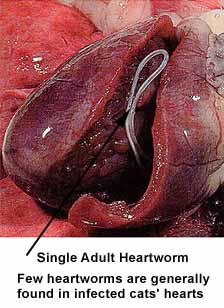Newsletter

The veterinarians and staff at the Sonoma County Mobile Veterinary Hospital are pleased to provide you with an online newsletter. This fun and fact-filled newsletter is updated on a regular basis.
Included in the newsletter are articles pertaining to pet care, information on our animal hospital, as well as news on the latest trends and discoveries in veterinary medicine.
Please enjoy the newsletter!
Current Newsletter Topics
Heartworm Treatment Removal of Adult Worms
Treatment of heartworm disease is a two step process. The first step is the elimination of adult heartworms that live in the pulmonary arteries and the heart. The second step is the elimination of the microfilariae that circulate in the bloodstream.
The microrofilariae are the microscopic, immature baby worms. They are picked up by the mosquito during a blood meal. The microfilariae go through a 2 week development period inside the mosquito. After this 2 week period, the microfilariae are ready to infect another dog. When the mosquito bites another dog (or another host), the microfilariae travel down the stinger and penetrate through the skin. These microscopic parasites spend 2 months under the skin of the newly infected animal until they enter the bloodstream. They remain in the bloodstream for several months until they reach their final destination, the pulmonary arteries and the heart. At this point, the parasites are adults, measuring 6-14 inches in length. A new cycle begins again as the adults reproduce and new microfilariae are released into the bloodstream.

Heartworm is a serious and often deadly disease. Treatment of heartworm disease is also serious. Before heartworm treatment begins, laboratory tests and x-rays are generally required. An animal must be healthy enough to undergo treatment.
Prevention is the best way to avoid heartworm disease. Call today to set up a heartworm test for your pet.
[ Search Articles ] [ Article Index ] [ Previous Page ]
